I love lists and was so hoping that I could use the mellifluous sounding "115 in 2015" as my theme for this New Year's Eve post, but alas, it was not to be. I finished 111 books this year, not all of them published in 2015, just books that came to my attention. Though it was a great year for the publishing industry (http://nyti.ms/1UhXTlf) I admit that I had a difficult time finding a book I could really rave about. This year's list is a bit more personal, a list of books, fiction and non, that spoke to me on some deep level beginning with:
1. Elena Ferrante's Neapolitan Trilogy. I cheated on this one since I felt that the three books are truly one long novel divided up by publisher, Europa Editions, simply for ease of reading. These novels about the strange, symbiotic relationship between two school girls, Elena and Lila, spans decades using the political and cultural evolution of Italy, from Naples to Milan, for a backdrop.
http://bit.ly/1PEbK6R, http://bit.ly/1OyWWXP
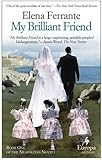 2. "Being Mortal," by Atul Gawande. This book came to me last January when my brother was facing his final days of life. Death and dying with dignity has long been an obsession of mine back to the days when my buddy Andrea Carter and I brought a six week discussion series (not very well attended, I might add) to our library. I'm still amazed at how few of us are able to speak honestly about the one thing we all share as humans - the end of life. This book should be required reading. http://bit.ly/1R18q74
3. "Redeployment," by Phil Klay. This powerful series of short stories brings the chaos of the war in Afghanistan into our minds and hearts. "When will we ever learn.....when will we ever learn." http://bit.ly/1L1Vl9o
2. "Being Mortal," by Atul Gawande. This book came to me last January when my brother was facing his final days of life. Death and dying with dignity has long been an obsession of mine back to the days when my buddy Andrea Carter and I brought a six week discussion series (not very well attended, I might add) to our library. I'm still amazed at how few of us are able to speak honestly about the one thing we all share as humans - the end of life. This book should be required reading. http://bit.ly/1R18q74
3. "Redeployment," by Phil Klay. This powerful series of short stories brings the chaos of the war in Afghanistan into our minds and hearts. "When will we ever learn.....when will we ever learn." http://bit.ly/1L1Vl9o
4. "Our Souls at Night" by Kent Haruf. Small but mighty, this is a gorgeous novel about two lonely souls having the courage to make a connection, flaunting small town small-mindedness, rising above salaciousness. The joy of the physical is not bound by age. http://bit.ly/1OurJhW
5. "Florence Gordon," by Brian Morton. An opinionated woman who refuses to age gracefully, beautifully rendered by a male author, Florence is this year's Olive Kitteridge in all her curmudgeonly glory. I hope to be her when I grow up.
http://bit.ly/1mrIcgr
6. "Between the World and Me," by Ta-Nehisi Coates. Reading this book, a letter to his fifteen-year-old son, will be the closest you'll ever come to knowing what it is like to walk in another man's skin. If you want to understand the power of the #blacklivesmatter movement, if you hope to even remotely fathom what it's like to be a black man in America today, look no further.
http://bit.ly/1JLnMVb
7. "My Song," by Harry Belafonte. This memoir is the perfect juxtaposition of Mr. Coates' cri de Coeur from a new generation. I knew that Belafonte was a force to be reckoned with in the black movement of the '60's but I had no idea what a powerful role he played and continues to play, always following his own conscience, his own song. This memoir reads like a history of the civil right movement in the twentieth century.
8. "Small Mercies," by Eddie Joyce is an incredible debut novel, one of my must reads of 2015. Set in Staten Island, New York, in a middle-class Irish-Italian neighborhood, Joyce captures to perfection the means in which small-town Americans rally around their own during times of extreme trouble, in this case the death of a local fireman at ground zero. http://bit.ly/1RT1zMA
9. "The Tsar of Love and Techno," by Anthony Marra. Here's a portion of what I had to say in this starred review for "Library Journal." Love and war, loyalty and betrayal, are themes inextricably joined in the literary imagination. Marra, who dazzled readers and critics with his debut novel, "A Constellation of Vital Phenomena," once again captivates with this collection of stories spanning 75 years. Linked by generations of political rebels, artists, soldiers, and criminals, these tales pay homage to the victims of the dissolution of the Soviet Union and the resulting wars in Chechnya.
10. "City on Fire," by Garth Risk Hallberg. This ferociously ambitious first novel apparently didn't live up to the hype. Readers today just aren't prepared to tackle these wonderful 800-plus page behemoths. But oh, what they're missing. Difficult to describe, this is a Dickensian romp through 1970's New York city, long before Mayor Bloomberg came along to clean things up. It's a mash-up of sex, drugs, rock and roll, the art scene, AIDS, nihilist philosophers in cahoots with businessmen of dubious wealth. It's "The Bonfire of the Vanities," on steroids.
 Now I'd like to hear from you. I have a give-a-way, a much anticipated novel by Charles Bock. It's called "Alice and Oliver," and I've just sent my review in to "Library Journal," so I'm free to mail this out to the first person who comments on this list or is willing to share their own favorites of 2015. There's so much I haven't read. Tell me what I need to put on my list for the new year. Thanks so much for reading!
Now I'd like to hear from you. I have a give-a-way, a much anticipated novel by Charles Bock. It's called "Alice and Oliver," and I've just sent my review in to "Library Journal," so I'm free to mail this out to the first person who comments on this list or is willing to share their own favorites of 2015. There's so much I haven't read. Tell me what I need to put on my list for the new year. Thanks so much for reading!
My friend Don and I have just returned to the real world after a ten day hiatus from the news. Except for our stop in Cartagena, Columbia, there was really nothing I wanted to see between Ft. Lauderdale and the Panama Canal. When I cruise, it's the days at sea, with nary a sight of land, that please me the most. There's nothing that beats lazing about on the balcony with a good book while the sound of the sea slapping the ship's hull forms a metronome in the background.
One of my shipboard pass times is to find the deck where I can walk a complete circuit and spy on what my fellow sailors are reading. The advent of ipads, kindles, and nooks has put a damper on this particular quirk. Based on what I saw, the old standbys like Baldacci, Flynn, Grisham, interspersed with a new Adrianna Trigiani and an Erica Spindler, along with a sports bio, "Lefty, An American Odyssey," I was pretty disappointed. Where are all the deep thinkers, I wondered. Then I had to laugh at my old book-snob self.
What had I brought along? "Death of a Red Heroine," by Qiu Xiaolong, the first in the Chief Inspector Chen series that Don, my resident Sinophile, discovered a few months ago and has been devouring. My second book was an assignment from "Library Journal," a novel to be released in April- review due Wednesday and not even begun - called "Alice and Oliver," by Charles Bock. The third was a potential book for my Florida radio program, "Under a Dark Summer Sky," a fictional account of life in the 1930's Florida Keys for the black families who had come to build Flagler's railway.
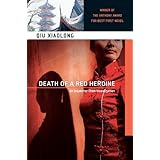
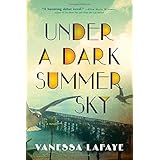 We had a delightful lunchtime discussion with a retired University of Toronto professor (who knows Margaret Atwood!) and his wife about print vs. digital books. The professor and I ganged up on Don, who is all digital, all the time. I'll wager that he has well over a hundred books on his ipad. I obsessed over the sensuous pleasure I felt upon opening Knopf's gorgeous edition of "M Train." The paper was like velvet.
Our professor worries, and studies back him up, that children whose first experiences with reading are digital, will, over time, lack focus and have difficulty retaining what they read. Don, on the other hand, loves being ecologically in the vanguard and gets off on the way he can immediately detour to Wikipedia whenever something comes up in a book that he questions or isn't sure about.
Print versus digital was also the subject of a chat we had at lunch with Philadelphia journalist, Bobbi Booker. A mover and shaker on the Philly scene, Ms. Booker works for the oldest black newspaper in America, "The Philadelphia Tribune," and had plenty to say about the demise of print media. If you're worrying, you can stop. The news from the bridge is good. People are reading, writing, and talking about reading and writing. Later this week I'll post my top ten favorite reads of the year - not the best books written - just the ones from the hundred and ten that spoke to me.
We had a delightful lunchtime discussion with a retired University of Toronto professor (who knows Margaret Atwood!) and his wife about print vs. digital books. The professor and I ganged up on Don, who is all digital, all the time. I'll wager that he has well over a hundred books on his ipad. I obsessed over the sensuous pleasure I felt upon opening Knopf's gorgeous edition of "M Train." The paper was like velvet.
Our professor worries, and studies back him up, that children whose first experiences with reading are digital, will, over time, lack focus and have difficulty retaining what they read. Don, on the other hand, loves being ecologically in the vanguard and gets off on the way he can immediately detour to Wikipedia whenever something comes up in a book that he questions or isn't sure about.
Print versus digital was also the subject of a chat we had at lunch with Philadelphia journalist, Bobbi Booker. A mover and shaker on the Philly scene, Ms. Booker works for the oldest black newspaper in America, "The Philadelphia Tribune," and had plenty to say about the demise of print media. If you're worrying, you can stop. The news from the bridge is good. People are reading, writing, and talking about reading and writing. Later this week I'll post my top ten favorite reads of the year - not the best books written - just the ones from the hundred and ten that spoke to me.
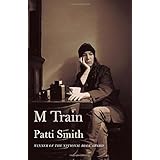 Patti Smith may look formidable on the cover of her most recent memoir, but if you've already read "Just Kids," her National Book Award-winning tale of her early years in New York City with Robert Mapplethorpe (a book whose beauty just knocked me flat), then you'll feel as if you're visiting with an old friend when you open "M Train." I started it last night and couldn't put it down.
Now, I'm no connoisseur of punk rock. In fact, the name Patti Smith was only something in the periphery of my core knowledge. I did not know of her talent as a poet, though it stands to reason that a song writer would have a flair as a wordsmith. "M Train" is a very different animal from "Just Kids," but it's a haunting piece of work just the same.
Librarians, readers, and writers just can't help but fall in love with a person so passionate about words. Smith's lyricism flows like a kind of prose poem as she takes us from the present to the past and back again in a dreamlike, stream of consciousness style. One moment we're in Mexico on the prowl for the best cup of coffee in the world, and the next we're ensconced in a London bedsit overdosing on British murder mysteries. "Luther," here we come.
Ms. Smith has a wildly eclectic taste in literature, often referencing books that she returns to time and again. She credits her mother, whose gifts of books she cherishes to this day, and fondly recalls being enthralled with "The Five Little Peppers and How They Grew." How many readers our age will even admit to that? Whether she's quoting Wittgenstein or passages from "The Story of Davy Crockett," we're right there with her.
There is a lovely soulfulness to Patti Smith's reminiscences. One minute she's taking us back to Michigan and her marriage, which ended so abruptly with the death of her husband at the ridiculous age of forty-five, the next, she's hiding in the bathroom at her daily haunt, the Café 'Ino, waiting impatiently for her table to be vacated by the interloper harping away on a cell phone and disturbing the atmosphere of Smith's favorite writing spot - other than her own bed.
Everyone seems to be putting out their "best of" lists too soon. There are fifteen days left until the end of the year. Just think what literary marvels might still be waiting to be discovered. I'll be traveling and devouring books over the next two weeks, taking a break from the Internet. Though "M Train" has just been added to my short list of favorites for the year I remain open to the next great read before 2016 arrives.
Patti Smith may look formidable on the cover of her most recent memoir, but if you've already read "Just Kids," her National Book Award-winning tale of her early years in New York City with Robert Mapplethorpe (a book whose beauty just knocked me flat), then you'll feel as if you're visiting with an old friend when you open "M Train." I started it last night and couldn't put it down.
Now, I'm no connoisseur of punk rock. In fact, the name Patti Smith was only something in the periphery of my core knowledge. I did not know of her talent as a poet, though it stands to reason that a song writer would have a flair as a wordsmith. "M Train" is a very different animal from "Just Kids," but it's a haunting piece of work just the same.
Librarians, readers, and writers just can't help but fall in love with a person so passionate about words. Smith's lyricism flows like a kind of prose poem as she takes us from the present to the past and back again in a dreamlike, stream of consciousness style. One moment we're in Mexico on the prowl for the best cup of coffee in the world, and the next we're ensconced in a London bedsit overdosing on British murder mysteries. "Luther," here we come.
Ms. Smith has a wildly eclectic taste in literature, often referencing books that she returns to time and again. She credits her mother, whose gifts of books she cherishes to this day, and fondly recalls being enthralled with "The Five Little Peppers and How They Grew." How many readers our age will even admit to that? Whether she's quoting Wittgenstein or passages from "The Story of Davy Crockett," we're right there with her.
There is a lovely soulfulness to Patti Smith's reminiscences. One minute she's taking us back to Michigan and her marriage, which ended so abruptly with the death of her husband at the ridiculous age of forty-five, the next, she's hiding in the bathroom at her daily haunt, the Café 'Ino, waiting impatiently for her table to be vacated by the interloper harping away on a cell phone and disturbing the atmosphere of Smith's favorite writing spot - other than her own bed.
Everyone seems to be putting out their "best of" lists too soon. There are fifteen days left until the end of the year. Just think what literary marvels might still be waiting to be discovered. I'll be traveling and devouring books over the next two weeks, taking a break from the Internet. Though "M Train" has just been added to my short list of favorites for the year I remain open to the next great read before 2016 arrives.
The third book in the simply outstanding Neapolitan trilogy by Elena Ferrante has taken a decidedly dark turn. "Those Who Leave and Those Who Stay," moves well into the adult years of the two women, Lena and Lila, who have been competing for each other's undivided attention since they were children. Their friendship has devolved into a power play in which Lila, at turns cruel and needy, withholds the approval and love that Elena so desperately needs from her.
Reflecting the times in which the novel takes place, Ferrante writes passionately about the women's movement in Italy, the advent of the pill (which Elena's husband refuses to let her take), and especially about the difference between the more educated, enlightened areas of the north, Milan, Florence, etc. where Elena lives vs. the southern area, Naples and its surrounds, where Lila works under inhumane conditions at a sausage factory.
Ferrante also tackles the political climate, as Lila's communist acquaintances put her in an untenable position at the factory, when they protest against the mob owners in an effort to unionize the workers. The dark underbelly of Italy is on full display.
 In a search for a lighter weekend read, I happened upon "Meeting the English," a smart, wisecracking send up of the British. This is a sinfully funny yet thoughtfully observant debut novel by Kate Clanchy, a young lady wise beyond her years, and it has the best opening pages I've read in years.
In a search for a lighter weekend read, I happened upon "Meeting the English," a smart, wisecracking send up of the British. This is a sinfully funny yet thoughtfully observant debut novel by Kate Clanchy, a young lady wise beyond her years, and it has the best opening pages I've read in years.
 Phillip Prys, once respected novelist and playwright, still being taught in schools but definitely on a down hill trend, is about to have a stroke, upending the lives of his wives, past and present, not to mention his kids and his agent. As Phillip languishes in a catatonic state in a wheelchair set up in the living room of his mansion on Yewtree Row, everyone scrambles to be first in line for the estate of the soon to be deceased Mr. Prys.
The only thing they haven't counted on is the bright, shiny young Scot, Struan Robertson, who's been hired down from the central highlands for a summer of caretaking of the great writer. Only seventeen, he is the original cockeyed optimist. After years of caring for his own Da, crippled with MS, Struan knows his way around a wheelchair, diapers, and the elderly. He has the confidence of the young, fully believing that Phillip will eventually return to the bosom of his family.
A lovely young fellow like Struan would find it impossible to believe that the family could care less. Phillip's former wife, Myfanwy, (don't ask) is an estate agent who can't wait to get her hands on the house, while his current wife, Shirin, forty years his junior, acts caring but has an artistic career that's blossoming, one she'd like to press on with.
The kids are complicated. Jake, the golden child, needs money to feed his hidden drug addiction and Juliet, unhappy and neglected by both parents, finds solace in food. What a delight it is to watch Struan walk into this dysfunctional mess, take charge of Mr. Prys, stand up to Jake, give Juliet the attention and direction she so desperately needs, and fall in love with Shirin, all within the course of one long, hot summer in 1989 London. A great weekend read.
Phillip Prys, once respected novelist and playwright, still being taught in schools but definitely on a down hill trend, is about to have a stroke, upending the lives of his wives, past and present, not to mention his kids and his agent. As Phillip languishes in a catatonic state in a wheelchair set up in the living room of his mansion on Yewtree Row, everyone scrambles to be first in line for the estate of the soon to be deceased Mr. Prys.
The only thing they haven't counted on is the bright, shiny young Scot, Struan Robertson, who's been hired down from the central highlands for a summer of caretaking of the great writer. Only seventeen, he is the original cockeyed optimist. After years of caring for his own Da, crippled with MS, Struan knows his way around a wheelchair, diapers, and the elderly. He has the confidence of the young, fully believing that Phillip will eventually return to the bosom of his family.
A lovely young fellow like Struan would find it impossible to believe that the family could care less. Phillip's former wife, Myfanwy, (don't ask) is an estate agent who can't wait to get her hands on the house, while his current wife, Shirin, forty years his junior, acts caring but has an artistic career that's blossoming, one she'd like to press on with.
The kids are complicated. Jake, the golden child, needs money to feed his hidden drug addiction and Juliet, unhappy and neglected by both parents, finds solace in food. What a delight it is to watch Struan walk into this dysfunctional mess, take charge of Mr. Prys, stand up to Jake, give Juliet the attention and direction she so desperately needs, and fall in love with Shirin, all within the course of one long, hot summer in 1989 London. A great weekend read.
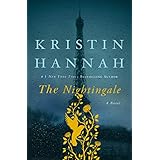 The '40's, the era of World War II, has always held an inordinate fascination for me, the clothes, the music, the literature and film. With the demise of so many members of the World War II generation, interest seems to have spiked and taken on a new urgency. But when a friend whose judgment I trust recommended Kristin Hannah's new book, "The Nightingale," about two French sisters living under the Vichy government, I thought, "could there possibly be anything new under the sun to say about this time in history?" It turns out that there isn't.
Now let me admit right up front that, yes, I cried toward the end of the novel, laughing at myself for being so easily manipulated. Just because a book isn't that well written doesn't mean that it can't hold your interest and even pack a punch. Though not original, the set up works. An elderly woman, preparing to sell her home and move to an assisted living facility, uncovers long-forgotten mementos in the attic, causing a flood of memories that had been too painful to share. Now, we learn about the sisters:
Vianne, the elder, follows the rules, keeps her head down, and stays out of trouble. She marries Antoine, her childhood friend and lover, pursuing a domestic idyll that allows no room for her younger sibling. Isabella is rebellious and independent by nature, managing to get herself kicked out of several schools, dreaming of a life lived out loud. The war offers her that opportunity.
History tells us time after time how many citizens of Germany, France, and Italy, underestimated the power of Hilter's reach. Even as they were packing suitcases and fleeing Paris, many thought they'd be back home within weeks. The years-long, horrific siege of France and its terrifying effect on the people comes through in Ms. Hannah's descriptions of the day to day lives in the small towns and villages like Carriveau where Vianne teaches school, raises her daughter, and waits for her soldier husband's return. In fact, Hannah's depictions of the hunger, cold, and deprivation of wartime France represent the most powerful sections of the book.
I suspect that most of us wonder at times how we would have responded if faced with similar circumstances. Could we stand up to the tyranny of having the enemy confiscate our homes, our lives? Would we speak out against the violence perpetrated upon our neighbors because of their religion? What inner fortitude turns one person into a collaborator and another into a resistor?
Herein lies my problem with "The Nightingale." There is absolutely no backstory that would remotely lead us to think that sixteen year old Isabelle Rossignol could transform overnight from a bratty schoolgirl to a woman who could lead downed Allied pilots over the French Pyrenees mountains to safety in Spain. All a reader can do is suspend disbelief, roll with the story, and try to overlook the more egregiously inept metaphors (a lanky young man resembled a comma - twice!)
Now, if you crave good historical fiction that's centered around the Nazi era and the French resistance, may I suggest a short list of some of my favorite novels, beautifully executed, and in the case of "All the Light We Cannot See," transcendent. First try anything by Irene Nemerovsky, then move on to the Marian Sutro series by Simon Mawer which includes "Trapeze," and "Tightrope." Take a look at Sebastian Faulks' "Charlotte Gray," and of course, de Rosnay's "Sarah's Key."
More like Kristin Hannah's book might be JoJo Moyes' "The Girl You Left Behind," or Anita Shreve's aptly named "Resistance." No matter what your tastes, happy reading!
The '40's, the era of World War II, has always held an inordinate fascination for me, the clothes, the music, the literature and film. With the demise of so many members of the World War II generation, interest seems to have spiked and taken on a new urgency. But when a friend whose judgment I trust recommended Kristin Hannah's new book, "The Nightingale," about two French sisters living under the Vichy government, I thought, "could there possibly be anything new under the sun to say about this time in history?" It turns out that there isn't.
Now let me admit right up front that, yes, I cried toward the end of the novel, laughing at myself for being so easily manipulated. Just because a book isn't that well written doesn't mean that it can't hold your interest and even pack a punch. Though not original, the set up works. An elderly woman, preparing to sell her home and move to an assisted living facility, uncovers long-forgotten mementos in the attic, causing a flood of memories that had been too painful to share. Now, we learn about the sisters:
Vianne, the elder, follows the rules, keeps her head down, and stays out of trouble. She marries Antoine, her childhood friend and lover, pursuing a domestic idyll that allows no room for her younger sibling. Isabella is rebellious and independent by nature, managing to get herself kicked out of several schools, dreaming of a life lived out loud. The war offers her that opportunity.
History tells us time after time how many citizens of Germany, France, and Italy, underestimated the power of Hilter's reach. Even as they were packing suitcases and fleeing Paris, many thought they'd be back home within weeks. The years-long, horrific siege of France and its terrifying effect on the people comes through in Ms. Hannah's descriptions of the day to day lives in the small towns and villages like Carriveau where Vianne teaches school, raises her daughter, and waits for her soldier husband's return. In fact, Hannah's depictions of the hunger, cold, and deprivation of wartime France represent the most powerful sections of the book.
I suspect that most of us wonder at times how we would have responded if faced with similar circumstances. Could we stand up to the tyranny of having the enemy confiscate our homes, our lives? Would we speak out against the violence perpetrated upon our neighbors because of their religion? What inner fortitude turns one person into a collaborator and another into a resistor?
Herein lies my problem with "The Nightingale." There is absolutely no backstory that would remotely lead us to think that sixteen year old Isabelle Rossignol could transform overnight from a bratty schoolgirl to a woman who could lead downed Allied pilots over the French Pyrenees mountains to safety in Spain. All a reader can do is suspend disbelief, roll with the story, and try to overlook the more egregiously inept metaphors (a lanky young man resembled a comma - twice!)
Now, if you crave good historical fiction that's centered around the Nazi era and the French resistance, may I suggest a short list of some of my favorite novels, beautifully executed, and in the case of "All the Light We Cannot See," transcendent. First try anything by Irene Nemerovsky, then move on to the Marian Sutro series by Simon Mawer which includes "Trapeze," and "Tightrope." Take a look at Sebastian Faulks' "Charlotte Gray," and of course, de Rosnay's "Sarah's Key."
More like Kristin Hannah's book might be JoJo Moyes' "The Girl You Left Behind," or Anita Shreve's aptly named "Resistance." No matter what your tastes, happy reading!
















